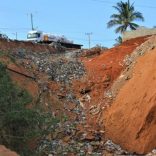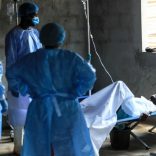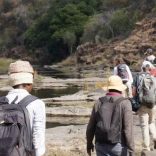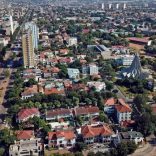Mozambique: North faces 'deepening' humanitarian crisis
A crime that could cost the future of thousands of children in public education … – O País

Photo: O País
The new curriculum Grade 4 textbooks are being diverted from the National Education System to feed informal commerce in the city of Maputo. Some are sold clandestinely in private schools, while children from public educational institutions study without textbooks. Those accused are school principals, with teachers as accomplices, O País reports.
It seems contradictory, but free textbooks whose sale is prohibited are on sale in the informal market and in some private schools in the city of Matola. They have been siphoned off from the public education system and are therefore not reaching their intended beneficiaries – children of public education who are forced to seat in threes or fours at a single desk so that they can share textbooks.
One example of this problem can be found at the 4 de Outubro Primary School in Matola, Maputo province. There, nearly 200 Grade 4 pupils lack textbooks, and others have so far not received any.
Those children without textbooks look over and copy everything, at a snail’s pace, into their own notebooks.
“There are people who are not committed to education”
The reason for this lack of textbooks is simple, and perhaps goes back a long way: the diversion of books by the management to feed the informal market, alleges “Evaristo”, an alias for one of the teachers at 4 de Outubro.
“The distribution of textbooks at the 4 de Outubro Primary School is not as equable as it should be. It’s simply that there are people who think they have the right to take some of the textbooks for their own profit,” Evaristo says.
This teacher does not, in fact, have any proof to support his denunciation. But the evidence of his eyes, seeing textbooks diverted even as they were distributed to students, remains vivid.
“I usually see a wide range of textbooks in the room where the books are distributed. And they take some [of these textbooks] and give them to teachers, and the rest are kept inside. Those textbooks don’t go out anymore. But, if the textbooks stay in the school directorate or principal’s office, it means that there are people who should be looking after them, but they take them [instead],” Evaristo says in a firm tone, indicating teachers as accomplices in a network he considers as “big, and growing”.
The supposed incidence of textbook diversion in the 4 October Primary School is on the increase, together with the difficulties of those teachers who have to work with children who do not have textbooks.
“There are people who are not committed to education. These people should reflect and think: ‘No, we cannot be like that’,” Evaristo complains.
The children keep studying …
Innocent and unaware that their textbooks have been diverted, the young students fight for strength in their dreams and continue their studies even without them. With their gaze ping-ponging between notebooks and the blackboard, they focus on the lesson, grasp their pens and write in their notebooks the path to a better and brighter future.
In their hearts and minds, there are dreams to be fulfilled, but the children are not unaware of the harsh reality they are living through, and which may jeopardise their future.
“I don’t have any textbooks. When I want to study, I borrow the book from my friend’s house. In the classroom, the teacher writes on the board and we copy it,” said Assucena Chirindza, one of the Grade 4 students at 4 de Outubro. “I would like to have all the books. If I did, I would study a lot more,” her classmate Eurico Sitoe chimes in.
But textbooks or no, the children keep studying. Teachers exhaust pedagogical theories and even test the improbable that results. “I have students who showed up on the first day of school and received textbooks. So, I put the students sitting three at a desk so that those who don’t have a textbook can peak at the others’. That way I can work,” Jafet Mabote, a Grade 4 teacher at 4 de Outubro says.
Teachers will continue to work under these conditions until the missing textbooks are replaced, though they have little hope of that happening. “Regarding Grade 4, this year, I doubt there will be replacements, considering that they are new books,” teacher Augusto Macarringue says in desperation.
“She hasn’t received textbooks in years”
Reacting to accusations about the alleged diversion of textbooks, the director of the 4 de Outubro Primary School denies it all, and notes that it is impossible to please all the parents and guardians.
“When a student’s guardian finds a book that does not have a cover or is missing a few pages, he thinks that the school has received a new textbook, but all the textbooks that the school receives it distributes to the students,” head of the 4 do Outubro school, Olga Francisco, asserts.
As to Grade 4 and the new curriculum specifically, Manuel acknowledges that the school did not receive enough textbooks, and professes not to know the exact number of students who received the first batch.
“I do not have an exact number, because we have not yet done the March 3 survey, due to the inflows and outflows, so I cannot say, with exactitude, that the number we have corresponds to our 157 students,” Director Francisco offers.
That is to say, there were students supposedly enrolling at the school after the textbooks were received. Matola District Education Services does not recognise these latecomers and says it only delivers Grade 4 textbook for the number of students anticipated, and that the 4 de Outubro school will have to explain where the other children come from.
Another student who hasn’t received a textbook for the 2020 academic year is little Shantia. She is in Grade 3 and studies at the Machava Primary School. Having no textbook, the 9-year-old is forced to copy everything into her notebook.
“The same thing happened in Grade 1,” Francisco Muianga, Shantia’s father reveals. “She hasn’t received textbooks in years and there’s nothing left to do but buy them for her.”
But, currently unemployed, Francisco is unable to buy on the informal market the books in the years that his daughter did not receive them free at school. “I will buy her the textbooks when I have the money, and if I don’t, there’s no way.”
Buying and selling
‘O País’ is aware that the textbooks, which all carry the ‘free distribution and prohibited sale’ imprint, are not intended for private schools, and if textbooks with this imprint turn up in private schools, they will have to explain how they got there.
Our report visited the Externato 3 de Maio, Maputo province, and there found all the students sitting comfortably each at their own desk, because there is no shortage of textbooks. Interestingly, theirs are the same ‘free distribution and prohibited sale’ textbooks that children attending public schools lack.
The textbooks arrive at that private institution through the parents who buy them in the informal market.
ALSO READ: 18 million textbooks will be distributed to schools free of charge – Ministry
Mozambique to distribute 14 million free school books
“We buy books for our students outside of school. At the beginning of the year, the institution gives us a list of the necessary material and the parents go buy them,” Idalina Guilengue, the guardian of one of the Externato 3 de Maio students explains. Her statements are supported by Amina Teixeira, who says that “We do indeed purchase the materials outside the school. It’s only the uniform we buy internally”.
The school management is aware of the prohibition on the use of manuals with the ‘free distribution and prohibited sale’ stamp, but overlooks the situation and allows them to be used.
“As is well known, text books that are freely distributed are never for private schools. So students or their guardians acquire according to their financial availability or by other means,” pedagogical director of Externato 3 de Maio Bernardo Massuquela says.
One way to acquire the textbooks is by secretly buying them from private schools.
Our report set up a ‘free distribution and prohibited sale’ textbook purchase at a private school somewhere in Matola. The first contact was made on the phone, where the ‘guardian’ chose the textbooks required, then we arranged to meet for the delivery.
The teacher with whom we first spoke takes us to the school grounds where, after waiting almost 15 minutes, her colleague appears with the books hidden in a folder. The lady receives the folder, comes to us and sells us the books for 250 meticais each.
Informal markets openly display the secondary school textbooks which are allowed to be sold. But, in boxes and very discreet, there also are the primary school books with the ‘free distribution and prohibited sale’ stamp.
In order to access them, the customer has only to express an interest and, immediately, the sellers take them out of the box and sell them at 150 meticais each, ‘O País’ established. And so, the illicit textbook sales business grows.
For the academic year 2020, 18,455,200 primary school books valued at approximately US$17 million were distributed free of charge, of which 4,264,000 are the new Grade 4 books. Of these, 236,000 were allocated to Maputo Province.
In addition to those public primary schools mentioned (Machava and 4 de Outubro), the following schools have insufficient textbooks: Dignidade Primary School, Mussumbuluco Primary School, Liberdade Complete School, Liqueleva Complete School and Unidade Primary School “ H ”, all in the city of Matola, Maputo province.
We contacted the Ministry of Education and Human Development, but the director in the textbook sector said that he would only speak to the media with the authorisation of his appropriate minister.
By Dário Cossa












Leave a Reply
Be the First to Comment!
You must be logged in to post a comment.
You must be logged in to post a comment.